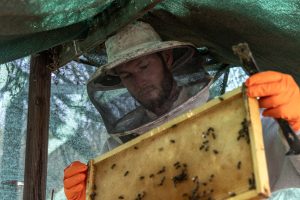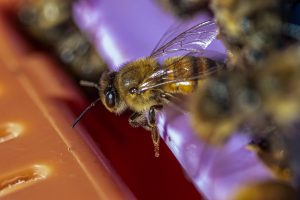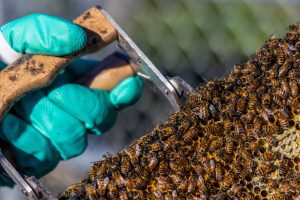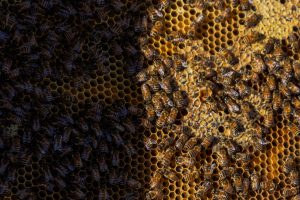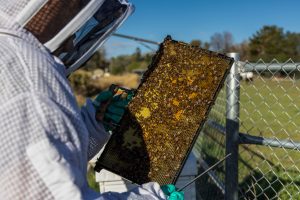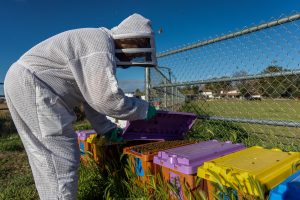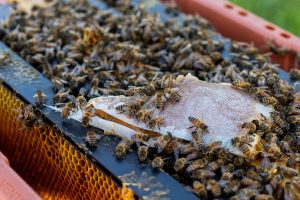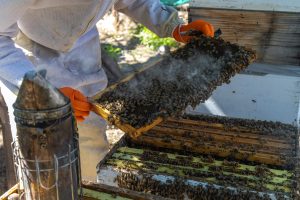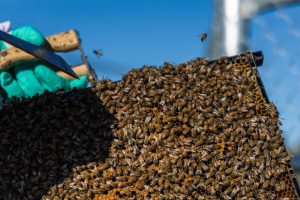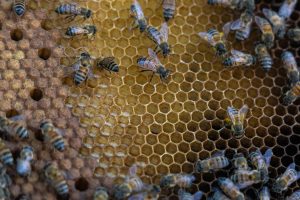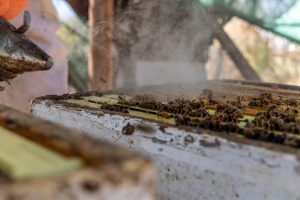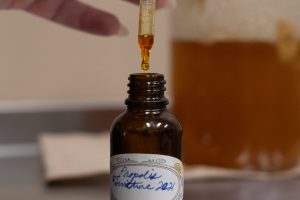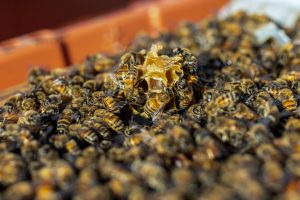- Slug: BC-CNS-Honey Allergies. 840 words.
- Photos available (thumbnails, captions below).
- Video story available.
By Naomi DuBovis
Cronkite News
SCOTTSDALE – Allergy season is here, and some sufferers consume local honey to alleviate their symptoms. But the jury is still out as to whether it’s a good strategy.
When it comes to eating honey for allergies, the evidence that it works is largely anecdotal, but beekeepers and experts agree that local honey is both tastier and healthier than honey at the supermarket.
Arizona Honey Market is a vendor that sells local honey online and at farmers markets. One type of honey it sells is its Allergy Mix, which is made specifically to be a remedy.
Jonathan Young, a beekeeper for Arizona Honey Market, said the Allergy Mix contains pollen saved from the entire year and from sources all around the Phoenix metro area. It’s not like most honey products, he said, because those only have one or two types of pollen. The idea is that exposure to pollen can help build tolerance to it.
“A regular honey would only be from a specific harvest period, and that harvest period is only going to have a specific type of pollen, whatever the bees are going to,” he said. “With the Allergy Mix, we kind of broaden the spectrum a little bit. We also increase the pollen content in it, so you don’t have to take as much of it.”
Young said that customers typically see results in a week if they eat it consistently and don’t cook it using high heat.
Scientific research hasn’t yet proven that eating honey helps allergies, said Dr. Julie Wendt, immunologist, allergist and owner of Relieve Allergy, Asthma & Hives in Scottsdale.
A 2021 mini review article published in Frontiers in Pharmacology looked at studies to gauge the efficacy of honey for allergy treatment, whether eaten or used in other forms such as salines and skin topicals. The review said that while some research on eating honey offers promising results, more research needs to be done.
Some factors the review mentioned that can lead to differing conclusions include the type of honey used (like local honey or a type called Manuka honey, from Australia and New Zealand), dosage and chemical composition.
Wendt said that the type of pollen people are exposed to matters when they’re trying to treat their allergies.
“The pollen in the air is windborne pollen. It’s very small, tends to be from local trees, grass, weeds, ragweeds and so forth,” Wendt said. “The pollen that attracts bees and moths tends to be sticky, bigger and (from) things like flowering plants. That tends not to be the problem for most people because it just doesn’t get into the airways.”
Wendt said the best way to prevent symptoms is to avoid exposure to allergens in the first place. She recommends closing windows, regularly changing air filters, washing pets when they come inside and showering at night to avoid getting pollen in bedsheets.
She said antihistamines should only be used as needed and that if patients are taking them more than a few times a week, other treatment options like allergy shots should be considered.
Despite the lack of scientific consensus on eating honey for allergies, Wendt said it doesn’t hurt to try, especially if patients aren’t interested in conventional medicine or allergy shots.
“When people ask about it … I say try it, give it a shot for a year and let’s see how it goes, and if it’s not adequate, think about coming back,” she said.
Wendt also said she’s hopeful that propolis, a resinous substance bees produce, can treat skin conditions like eczema. Wendt said she and two patients with eczema have seen improvement after using a propolis salve but that a large study is needed to say for sure that it works.
Regardless of whether someone muddles through seasonal allergies, Arizona beekeepers say buying honey locally is a better choice than buying from the grocery store.
Duane Combs, president of the Beekeepers Association of Central Arizona and owner of Arizona Beekeepers LLC, said most honey on supermarket shelves is doctored.
“They do two things to it: One is they pasteurize it so it has a longer shelf life. And when they do that, they kill the enzymes,” he said. “Second, they import honey. And if you’re getting honey … from China and India especially, it’s going to be adulterated with some form of rice sugar or corn syrup or some other sugar.”
Wendt said she gets her honey from local beekeepers for the taste.
“Local honey is just so much better. It’s thicker, it’s not processed,” she said. “I almost can’t eat regular honey at the supermarket because it seems watered down and thin.”
She noted, however, that children under a year old should never eat unprocessed honey because of the risk of botulism.
Combs said he’s had his share of people saying his honey helped with their allergies.
“Now, is that because of physically something of the honey or is that psychological? I don’t know, and I don’t care,” he said. “I just am happy to sell honey.”
For more stories from Cronkite News, visit cronkitenews.azpbs.org.
